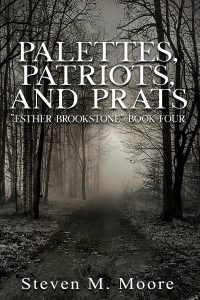The test of time?
Which books deserve to be called classics? Anthony Scaramucci in From Wall Street to the White House and Back (probably the strangest self-help book you’ll ever read!) touts reading classics, defining them as works that have stood the “test of time.” (Surprised I read this book? It’s a profound and yet sometimes hilarious book that I can strongly recommend despite not sharing the author’s political proclivities.) I suppose that definition is okay as far as it goes…but whose test, how long a time, and fiction or non-fiction, including types?
 In several of my “Esther Brookstone Art Detective” stories (both novels – nine of them! – and short fiction), I point out that Esther in her Masterworks Gallery features pre- and early Renaissance paintings because she believes they are works that could have been masterpieces (art’s version of “classics”) but for fickle fate; she restores and sells them in the gallery, making a good living at it there on the Old Smoke’s West End.
In several of my “Esther Brookstone Art Detective” stories (both novels – nine of them! – and short fiction), I point out that Esther in her Masterworks Gallery features pre- and early Renaissance paintings because she believes they are works that could have been masterpieces (art’s version of “classics”) but for fickle fate; she restores and sells them in the gallery, making a good living at it there on the Old Smoke’s West End.
What goes for painting also goes for books! Readers should look at the books that are considered classics just like we do, for example, at van Gogh’s “Starry Night,” etc., and decide for ourselves if a more detailed study is warranted because it will bring more meaning to our lives. I’m sure there will be books and stories that critics have passed over, readers finding meaning that no erudite literary expert has ever noted!
 Example: I’ve found a lot more meaning, let’s call it profoundness, in Deaver’s Garden of Beasts and Follett’s Eye of the Needle than in these authors’ other books. Those other books are entertaining but not of the same quality for me. In Mr. Scaramucci’s defense, he does recommend “picking books at random to see what’s inside.” That’s exactly how I discovered the two books just mentioned. In fact, most of the books on the “Steve’s bookshelf” web page are what I would call classics. Critics and those erudite literary experts probably won’t agree with me, but to hell with them! What’s amusing is that none of the books in Scaramucci’s reading list at the end of his book are called classics by so-called experts! They are for Mr. Scaramucci, though.
Example: I’ve found a lot more meaning, let’s call it profoundness, in Deaver’s Garden of Beasts and Follett’s Eye of the Needle than in these authors’ other books. Those other books are entertaining but not of the same quality for me. In Mr. Scaramucci’s defense, he does recommend “picking books at random to see what’s inside.” That’s exactly how I discovered the two books just mentioned. In fact, most of the books on the “Steve’s bookshelf” web page are what I would call classics. Critics and those erudite literary experts probably won’t agree with me, but to hell with them! What’s amusing is that none of the books in Scaramucci’s reading list at the end of his book are called classics by so-called experts! They are for Mr. Scaramucci, though.
It’s unfortunate that reading is being replaced by computer games; streaming video; Fox News or CNN and MSNBC, usually Fox or CNN/MSNBC but not both; Facebook, Instagram, TikTok, X (formerly known as Twitter), etc.; and far too many echo chambers catering to competing tribes. We can find more meaning in our lives, understanding of others, and eternal truths in the fiction and non-fiction we read. We can do that in other media as well—art and music, for example—but books have all the other media beat.
Books offer personalized discovery. I would have gone on considering Anthony Scaramucci to be a lightweight MAGA maniac, for example, if I hadn’t read his book; he actually offers lessons about how to give meaning to our lives. Of course, other authors have offered similar lessons, even in fiction. But my life was enriched by having a conversation with an author by reading his book. If anything, that’s a valuable lesson!
***
Comments are always welcome. (Please follow the rules on the “Join the Conversation” web page.
Free fiction! (Hey, I have to compete with Prime Days somehow!) It’s time you examined the list of freebies on the “Free Stuff & Contests” web page. All you have to do is click on the file name to download your free PDF! For writers, there’s also the self-help guide “Writing Fiction.” No, I don’t tell you how to write a good story…that’s on you! But you might enjoy and learn a few new tricks by reading about the errors I made in publishing mine. These are all free…so what can you lose?
Around the world and to the stars! In libris libertas!
